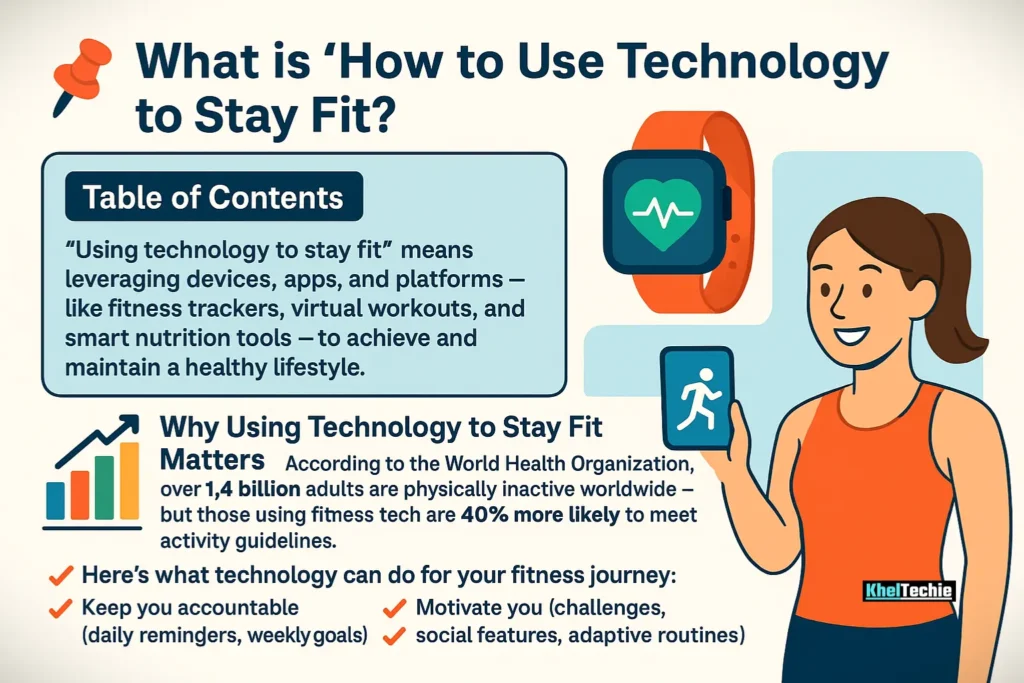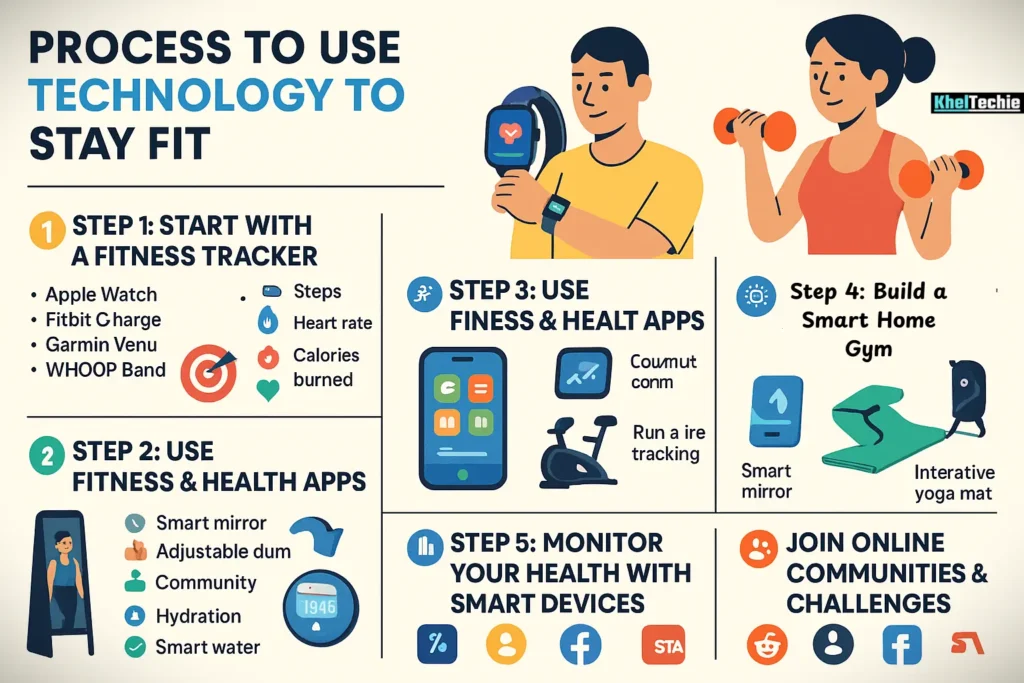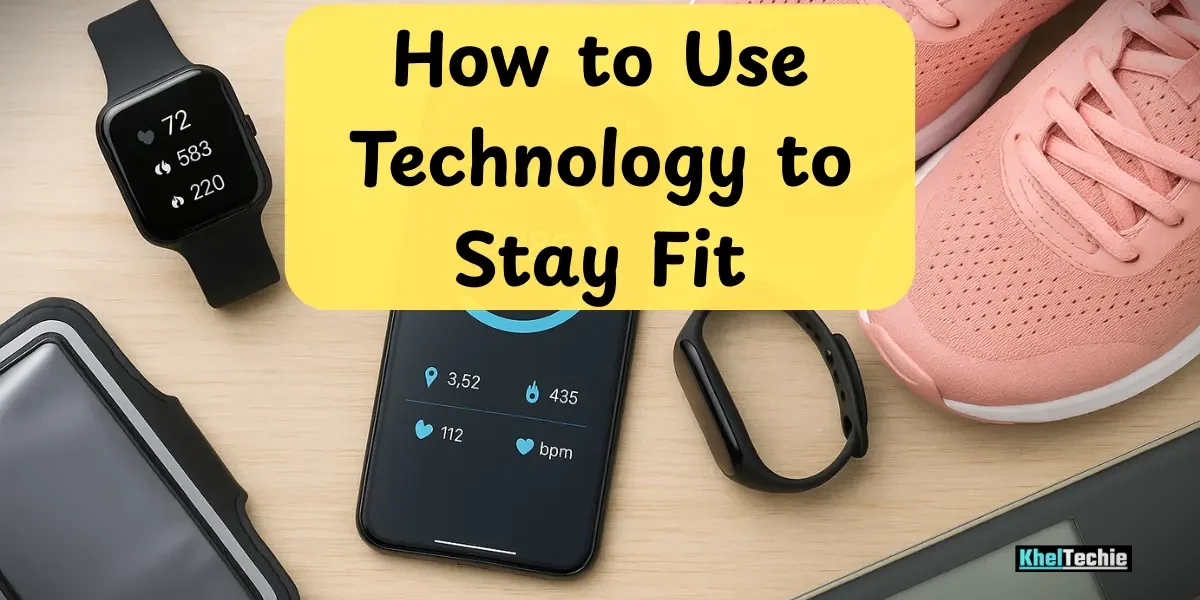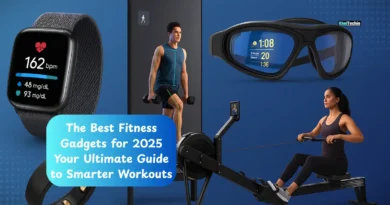How to Use Technology to Stay Fit|Smart Fitness in 2025
Technology won’t replace your workouts, it’ll amplify them.
Are you tired of setting fitness goals only to abandon them after a few weeks? You’re not alone. The good news? In 2025, staying fit doesn’t have to mean waking up at 5 AM or joining an overpriced gym. With the right tech tools, staying healthy has never been more accessible or more fun.
From smartwatches that monitor your heartbeat to AI-powered workout apps that act like personal trainers, learning how to use technology to stay fit can be the game-changer your routine has been missing.

What is “How to Use Technology to Stay Fit”?
Think of it like this: technology is your modern-day fitness buddy. Whether it’s an app that reminds you to drink water or a smartwatch that nudges you to get up and walk, the goal is simple, use digital tools to help you stay active, eat better, and rest smarter.
In simple terms:
“Using technology to stay fit” means leveraging devices, apps, and platforms like fitness trackers, virtual workouts, and smart nutrition, tools to achieve and maintain a healthy lifestyle.
Why Using Technology to Stay Fit Matters
Let’s hit you with a powerful stat:
📊 According to the World Health Organization, over 1.4 billion adults are physically inactive worldwide, but those using fitness tech are 40% more likely to meet activity guidelines.
I’ve seen this firsthand. A few years ago, I could barely run a mile. But with the help of a running app (and a lot of stubbornness), I’ve now completed three half-marathons. That’s the power of smart tech.
Here’s what technology can do for your fitness journey:
- Keep you accountable (daily reminders, weekly goals)
- Track your progress (steps, calories, workouts)
- Motivate you (challenges, social features)
- Personalize your workouts (AI coaching, adaptive routines)

Process to Use Technology to Stay Fit
Whether you’re just starting out or upgrading your routine, here’s a step-by-step breakdown:
🥇 Step 1: Start With a Fitness Tracker
You can’t improve what you don’t measure.
Tools to use:
- Apple Watch
- Fitbit Charge
- Garmin Venu
- WHOOP Band
What it tracks:
- Steps
- Heart rate
- Calories burned
- Sleep quality
- VO2 max (in advanced models)
Set realistic daily goals (e.g., 8,000 steps) and turn on movement reminders.
Step 2: Use Fitness & Health Apps
Apps bring the gym to your pocket.
| App | Feature | Platform |
|---|---|---|
| MyFitnessPal | Calorie & macro tracking | iOS/Android |
| Nike Training Club | Home & gym workouts | iOS/Android |
| FitOn | Free classes & community | iOS/Android |
| Strava | Run & ride tracking | iOS/Android |
| Zero | Fasting & nutrition insights | iOS/Android |
These apps use AI to learn your habits and suggest better routines over time.
Step 3: Embrace AI-Powered Coaching
Virtual trainers that actually get you.
AI fitness platforms like Freeletics or Future Coach use your performance and goals to customize plans in real-time. Some even offer 1:1 virtual coaching with human trainers.
Think of it as Netflix for fitness, the more you train, the smarter your workouts become.
🏋️♀️ Step 4: Build a Smart Home Gym
Who needs a gym membership when your living room can become a tech-powered fitness zone?
Must-have tech:
- Smart mirrors (e.g., Mirror, Tonal)
- Adjustable dumbbells (e.g., Bowflex SelectTech)
- Peloton or NordicTrack bikes
- Interactive yoga mats
These tools provide guided workouts, real-time feedback, and gamified experiences.
Step 5: Monitor Your Health with Smart Devices
It’s not just about exercise, it’s about total health.
Top health tech:
- Smart scales (e.g., Withings Body+) for BMI, body fat, water %
- Sleep trackers (e.g., Oura Ring, Sleep Cycle)
- Hydration apps that remind you to drink water
- Smart water bottles that track intake (e.g., HidrateSpark)
Connect your devices for seamless tracking via Apple Health or Google Fit.
Step 6: Join Online Communities & Challenges
Fitness is more fun when you’re not doing it alone.
Platforms to explore:
- Reddit r/fitness
- Fitbit or Garmin Challenges
- Facebook fitness groups
- Strava segments
- Virtual 5Ks or charity runs
You’ll get:
- Motivation
- Accountability
- Friendly competition
Common Mistakes to Avoid When Using Fitness Tech
Even the best tech can’t fix bad habits. Here’s what to watch out for:
- Data obsession: Don’t let numbers replace how you feel.
- Inconsistency: Tracking only works if you’re consistent.
- Overtraining: Rest days are just as important.
- Ignoring form: Virtual trainers can’t always spot bad posture.
- Neglecting nutrition: No amount of steps can outwalk a poor diet.
- Buying too much: You don’t need every gadget, just the right ones.
Stick to 1–2 core tools and master them before upgrading.
Final Tips from Ashish
Here are a few nuggets I’ve picked up over the years:
- Start small. One app or device is all you need to start.
- Stay consistent. 20 minutes a day beats 2 hours once a week.
- Keep it fun. Gamify your workouts with challenges and rewards.
- Track less, feel more. Don’t lose sight of how you feel day to day.
Conclusion: Ready to Let Tech Take Your Fitness to the Next Level?
Tech doesn’t just track your journey, it enhances it. Whether you’re a couch potato or a seasoned athlete, there’s a gadget or app waiting to elevate your game. But remember, you are the one in control. Technology is just the co-pilot.
So go ahead:
🎯 Download that app.
⌚ Strap on that smartwatch.
💪 Join that virtual challenge.
And most importantly, start moving.
💬 What’s your favorite piece of fitness tech? Drop a comment or share this article with a friend who needs a tech-powered fitness boost!
❓ FAQs
How do I start using tech for fitness if I’m a beginner?
Start with a basic fitness tracker like Fitbit Inspire and a free app like FitOn. Set small goals, like 20-minute walks or stretching routines.
Are fitness trackers really accurate?
Most are 80–90% accurate for step counting and heart rate. Advanced models offer better precision, but the key is consistency, not perfection.
Can I get fit without a gym using only tech?
Absolutely. Smart home gym equipment, fitness apps, and YouTube classes can help you build muscle, lose weight, or boost endurance — right from home.
What’s the best fitness app in 2025?
It depends on your goals. For overall health, MyFitnessPal and Nike Training Club are top-rated. For running, go with Strava.
Is AI coaching better than a real trainer?
AI is great for affordability and flexibility. But for personalized attention, a hybrid model (virtual trainer + AI app) is the sweet spot.
How do I track calories and macros easily?
Use apps like MyFitnessPal, Yazio, or Cronometer. Scan barcodes, set macro goals, and sync with your fitness tracker for seamless data.
Do smartwatches really help with weight loss?
Yes — studies show users wearing fitness trackers are 30–40% more active, leading to more consistent weight loss over time.
How does sleep tech improve fitness?
Poor sleep wrecks recovery and energy levels. Sleep trackers help optimize bedtime habits, detect disturbances, and offer tailored tips for better rest.
Are there affordable tech tools for staying fit?
Yes! Budget-friendly picks:
Resistance band sets with app support
Mi Band (under $40)
Smart scale (under $50)
Free fitness apps (FitOn, Nike Training)
Can technology replace human motivation?
It can support it — not replace it. Motivation still comes from within, but tech gives you reminders, encouragement, and gamified rewards.





Pingback: Easy Keto Meal Plan For Beginners: Your 7-Day Guide
Pingback: Best Fitness Gear Gifts For Father’s Day 2025 : Active Dad
Pingback: Realistic Fitness Goals For College Students 2025 Edition!